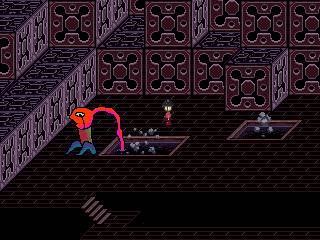 Yume Nikki is so strange…and so familiar! It is everything games used to be but no longer are.
Yume Nikki is so strange…and so familiar! It is everything games used to be but no longer are.
When I say it’s like a classic adventure game, I don’t mean it’s like Escape from Monkey Island. It’s more like the odd and dissolute wave of adventure games that came out during the CD-rom revolution. In the early to mid 90s, publishers were hungry for CD-based games and released (in addition to a deluge of crappy knockoffs) quite a few experimental and anticommercial titles like Bad Mojo and I Have No Mouth and I Must Scream that normally would never have made it to store shelves.
Yume Nikki (made in RPGMaker 2003 by Kikiyama), is basic and minimal. You play as a reclusive girl who has dreams and then writes the dreams down in a diary. You have a small house to explore, and a bed to dream in. You access dreams via a central nexus point with twelve doors. Each of the doors takes you to a world so strange and so huge that you might never find your way back.
There’s no dialogue, and no obvious story. The game is free-flowing and open, and mostly consists of exploring strange and confusing lands beyond the veil of sleep. You can wake yourself up at any time by pinching your face. In the dream worlds there are items that can be collected, although many of them seem useless. The NPCs aren’t much help, either. Ultimately, you’re on your own, and you have to discover what purpose Yume Nikki has…or if it even has one.
You can see what creative well Kikiyama was drawing from here. The rudimentary graphics, soothing music, and “do whatever you want” gameplay synthesises into a game with a powerful and spellbinding atmosphere. Any deficiencies in content are remedied by your own brain. Needless to say, you can find numerous fan theories online “explaining” every little thing from the theories of Freud and Jung.
The game’s ending (if you’re able to find it) is surprising. I’ve only played one game that ends the way Yume Nikki does (Creative Reality’s 1994 game DreamWeb), although Yume Nikki colours the darkness with a bit of mystery. There is a small detail about the environment, easy to miss, that will cause you to rethink the ending and its implications.
But even the fact that it has an ending seems unimportant. It might have just kept on going forever. This isn’t a game you play, complete, and check off your Gamer’s Literary Card. It’s more of an interactive digital experience that has value only equal to the effort you put into it. Either way, it should be played. Yume Nikki a unique and eerie time capsule into gaming’s darkening past.
No Comments »
Comments are moderated and may take up to 24 hours to appear.
No comments yet.
